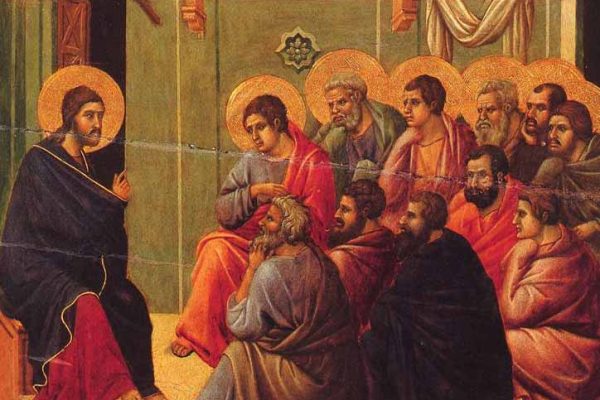Home>Bible Facts>How Does Bartholomew Differ From The Other Apostles


Bible Facts
How Does Bartholomew Differ From The Other Apostles
Published: February 23, 2024
Jason DeRose, Managing Editor at Christian.net, uses his expertise in religion and journalism to deepen understanding of faith's societal impacts. His editorial leadership, coupled with a strong academic background, enriches the platform’s diverse content, earning him recognition in both journalism and religious circles.
Discover how Bartholomew stands out among the apostles in the Bible. Uncover intriguing Bible facts about Bartholomew's unique role and contributions.
(Many of the links in this article redirect to a specific reviewed product. Your purchase of these products through affiliate links helps to generate commission for Christian.net, at no extra cost. Learn more)
Table of Contents
Introduction
Bartholomew, one of the twelve apostles chosen by Jesus Christ, holds a unique position among the disciples. His story is both intriguing and enigmatic, as he is often mentioned alongside the other apostles but with less prominence. Understanding how Bartholomew differs from the other apostles sheds light on the diverse personalities and roles within the group of disciples. Delving into the background, significance, and distinctive traits of Bartholomew provides a deeper appreciation for his contributions to the early Christian community and the spread of the gospel.
Bartholomew's journey as an apostle is intertwined with the larger narrative of Jesus' ministry and the establishment of the Christian faith. Exploring his distinctiveness in comparison to the other apostles offers valuable insights into the dynamics and dynamics of the apostolic circle. This exploration will uncover the multifaceted nature of the apostolic band and the individual characteristics that shaped their roles in the early Christian movement.
Background of Bartholomew and the other apostles
Bartholomew, also known as Nathanael, was among the twelve apostles chosen by Jesus Christ. His background, like that of the other apostles, reflects the diverse and multifaceted nature of the individuals called to be Christ's closest followers. The apostolic band comprised individuals from various walks of life, each bringing unique experiences and perspectives to their collective mission.
Bartholomew's background, though not extensively documented in the New Testament, is believed to be rooted in Galilee, a region known for its rich cultural tapestry and diverse population. This setting likely influenced Bartholomew's worldview and interactions with the people he encountered during his ministry.
Similarly, the other apostles hailed from different regions and social backgrounds, contributing to the rich tapestry of experiences within the group. For instance, Peter and Andrew were fishermen, while Matthew was a tax collector. This diversity among the apostles underscored the universality of Jesus' message, transcending societal boundaries and embracing individuals from all walks of life.
The apostles' shared experiences with Jesus, witnessing his teachings, miracles, and ultimate sacrifice, formed a profound bond among them. Their backgrounds, while varied, converged in their commitment to spreading the gospel and establishing the early Christian community. This shared purpose united them in their mission, despite their individual differences and unique backgrounds.
Understanding the background of Bartholomew and the other apostles provides a glimpse into the rich tapestry of human experiences that shaped the early Christian movement. It underscores the universal appeal of Jesus' message and the inclusive nature of his ministry, which transcended social, cultural, and geographical boundaries. This diversity within the apostolic circle laid the foundation for a global faith that continues to resonate across continents and centuries.
Role and significance of Bartholomew among the apostles
Bartholomew, also known as Nathanael, played a pivotal role among the apostles, contributing significantly to the early Christian movement. Despite the relatively sparse mention of him in the New Testament, Bartholomew's influence and significance are underscored by his unwavering commitment to Jesus' teachings and the spread of the gospel.
One of the key aspects of Bartholomew's significance lies in his steadfast dedication to Jesus' mission. Alongside the other apostles, Bartholomew wholeheartedly embraced the teachings of Jesus and actively participated in his ministry. His unwavering faith and commitment to the cause exemplified the resilience and determination that characterized the apostolic band.
Bartholomew's significance is also evident in his role as a witness to Jesus' life, teachings, and resurrection. As one of the chosen twelve, he bore firsthand witness to the transformative impact of Jesus' ministry and the profound truths he imparted. This firsthand experience equipped Bartholomew to become a compelling advocate for the Christian faith, sharing the message of salvation with unwavering conviction.
Furthermore, Bartholomew's significance among the apostles is reflected in his contributions to the early Christian community. His efforts, alongside those of his fellow apostles, were instrumental in laying the groundwork for the establishment of the early church. Bartholomew's unwavering commitment to the gospel message and his active involvement in spreading the Good News contributed to the expansion of the Christian faith beyond the confines of the apostolic circle.
Additionally, Bartholomew's significance is underscored by his enduring legacy within Christian tradition. Despite the limited references to him in the New Testament, Bartholomew's influence extended beyond his immediate historical context, shaping the collective memory of the early Christian community. His steadfast dedication and contributions to the faith served as a testament to the transformative power of Jesus' message and the enduring impact of his chosen disciples.
In summary, Bartholomew's role and significance among the apostles are characterized by his unwavering commitment to Jesus' mission, his firsthand witness to the transformative impact of Jesus' ministry, his contributions to the early Christian community, and his enduring legacy within Christian tradition. These aspects collectively highlight the profound influence of Bartholomew within the apostolic circle and the broader narrative of the Christian faith.
Differences in personality and characteristics
The apostolic band, comprising individuals with diverse backgrounds and experiences, exhibited a wide array of personalities and characteristics. Bartholomew, in particular, possessed distinct traits that set him apart from the other apostles, contributing to the rich tapestry of the apostolic circle.
Bartholomew's personality was marked by a deep sense of introspection and contemplation. His thoughtful nature and propensity for reflection distinguished him within the group of apostles. This introspective quality likely influenced his interactions with others and his approach to sharing the teachings of Jesus. While some apostles may have been more outspoken or assertive, Bartholomew's contemplative demeanor added a layer of depth to the collective dynamic of the apostolic band.
Furthermore, Bartholomew exhibited a profound sense of empathy and compassion, traits that resonated deeply with his role as a disciple of Jesus. His ability to empathize with others and demonstrate compassion in his interactions reflected a unique facet of his character. This compassionate disposition likely endeared him to those he encountered during his ministry, fostering genuine connections and fostering a sense of inclusivity within the early Christian community.
In addition to his introspective and compassionate nature, Bartholomew displayed a remarkable humility that permeated his interactions with both his fellow apostles and the individuals he encountered during his ministry. His humility, coupled with a genuine desire to serve others, exemplified the selfless ethos that underpinned the apostolic mission. This humility set Bartholomew apart as a model of servant leadership, embodying the principles espoused by Jesus in his teachings and actions.
Moreover, Bartholomew's steadfast faith and unwavering commitment to Jesus' message distinguished him as a pillar of strength within the apostolic band. His resolute belief in the transformative power of the gospel and his dedication to sharing this message with others exemplified the depth of his faith. This unwavering commitment served as a source of inspiration for his fellow apostles and the burgeoning Christian community, reinforcing the collective resolve to advance the cause of the faith.
In summary, Bartholomew's personality and characteristics, characterized by introspection, compassion, humility, and unwavering faith, set him apart from the other apostles. These distinctive traits enriched the apostolic circle, contributing to a multifaceted dynamic that propelled the early Christian movement forward. Understanding the nuances of Bartholomew's personality provides valuable insights into the diverse array of individuals who played integral roles in shaping the narrative of the Christian faith.
Unique experiences and contributions
Bartholomew, also known as Nathanael, brought a wealth of unique experiences and made significant contributions that distinguished him among the apostles. His journey as a disciple of Jesus was marked by transformative encounters and unwavering dedication to the spread of the gospel.
One of Bartholomew's distinctive experiences was his encounter with Jesus as recorded in the Gospel of John. When Philip, another apostle, informed Nathanael about Jesus of Nazareth, Nathanael expressed skepticism, questioning whether anything good could come from Nazareth. However, upon meeting Jesus, he experienced a profound revelation. Jesus, recognizing Nathanael's true character, declared, "Here truly is an Israelite in whom there is no deceit." This encounter not only revealed Jesus' divine insight but also demonstrated Nathanael's openness to transformative experiences. His willingness to engage in dialogue and his receptiveness to new perspectives exemplified his capacity for growth and spiritual insight.
Furthermore, Bartholomew's contributions to the apostolic mission were characterized by his unwavering commitment to sharing the gospel message. His active participation in Jesus' ministry, coupled with his subsequent efforts to propagate the teachings of Christ, underscored his pivotal role in advancing the early Christian movement. Bartholomew's dedication to spreading the Good News, despite encountering challenges and opposition, exemplified his resilience and unwavering faith in the transformative power of Jesus' message.
Additionally, Bartholomew's unique experiences extended to his role as a witness to Jesus' resurrection and ascension. As one of the chosen twelve, he bore firsthand witness to the culmination of Jesus' earthly ministry and the dawn of a new era for humanity. This profound experience equipped Bartholomew to become a compelling advocate for the Christian faith, as he shared the testimony of Jesus' resurrection with unwavering conviction. His role as a witness to these transformative events solidified his contributions to the early Christian community and underscored the enduring impact of his experiences.
Moreover, Bartholomew's contributions were not confined to his immediate interactions with Jesus and the apostolic circle. His efforts to establish and nurture Christian communities, coupled with his unwavering commitment to the gospel message, left an indelible mark on the early Christian movement. His enduring legacy, shaped by his unique experiences and unwavering dedication, continues to inspire and resonate within the broader narrative of the Christian faith.
In summary, Bartholomew's unique experiences, including his transformative encounter with Jesus, his contributions to the apostolic mission, his role as a witness to Jesus' resurrection and ascension, and his enduring legacy within the early Christian community, distinguished him as a pivotal figure among the apostles. These experiences and contributions collectively underscored the profound impact of Bartholomew within the apostolic circle and the broader narrative of the Christian faith.
Conclusion
In conclusion, the exploration of Bartholomew's distinctiveness among the apostles unveils a multifaceted narrative that enriches our understanding of the early Christian movement. Bartholomew, also known as Nathanael, emerges as a figure of profound significance, characterized by unique experiences, unwavering dedication, and distinctive traits that set him apart within the apostolic band.
Bartholomew's background and the diverse tapestry of experiences within the apostolic circle underscore the universal appeal of Jesus' message, transcending societal, cultural, and geographical boundaries. The collective experiences of the apostles, including Bartholomew, laid the foundation for a global faith that continues to resonate across continents and centuries.
His unwavering commitment to Jesus' mission, firsthand witness to transformative events, and enduring legacy within Christian tradition highlight the profound influence of Bartholomew. His contributions to the early Christian community, coupled with his unique experiences, solidify his pivotal role in shaping the narrative of the Christian faith.
Furthermore, Bartholomew's distinct personality and characteristics, marked by introspection, compassion, humility, and unwavering faith, enriched the apostolic circle, contributing to a multifaceted dynamic that propelled the early Christian movement forward. Understanding the nuances of Bartholomew's personality provides valuable insights into the diverse array of individuals who played integral roles in shaping the narrative of the Christian faith.
Bartholomew's unique experiences, including his transformative encounter with Jesus, his contributions to the apostolic mission, his role as a witness to Jesus' resurrection and ascension, and his enduring legacy within the early Christian community, distinguished him as a pivotal figure among the apostles. These experiences and contributions collectively underscored the profound impact of Bartholomew within the apostolic circle and the broader narrative of the Christian faith.
In essence, the exploration of Bartholomew's distinctiveness among the apostles illuminates the rich tapestry of human experiences and the diverse array of personalities that contributed to the early Christian movement. His unwavering commitment, unique experiences, and enduring legacy serve as a testament to the transformative power of Jesus' message and the enduring impact of his chosen disciples, including Bartholomew, in shaping the narrative of the Christian faith.














